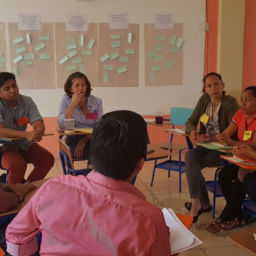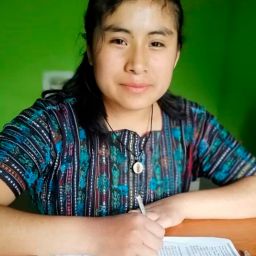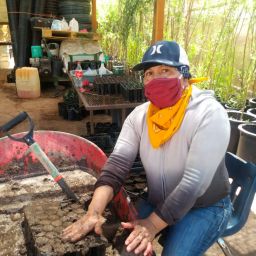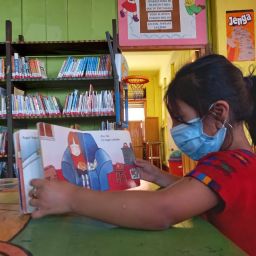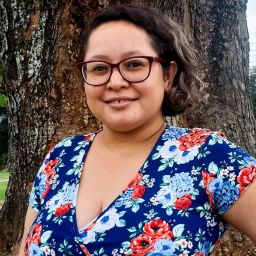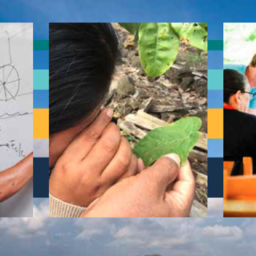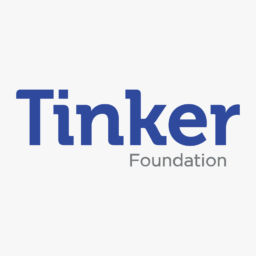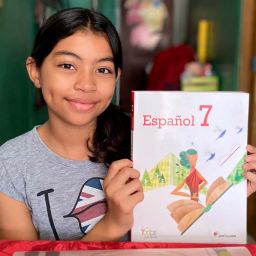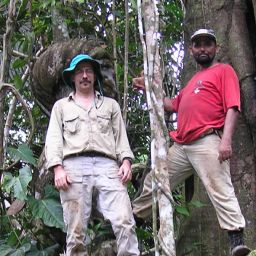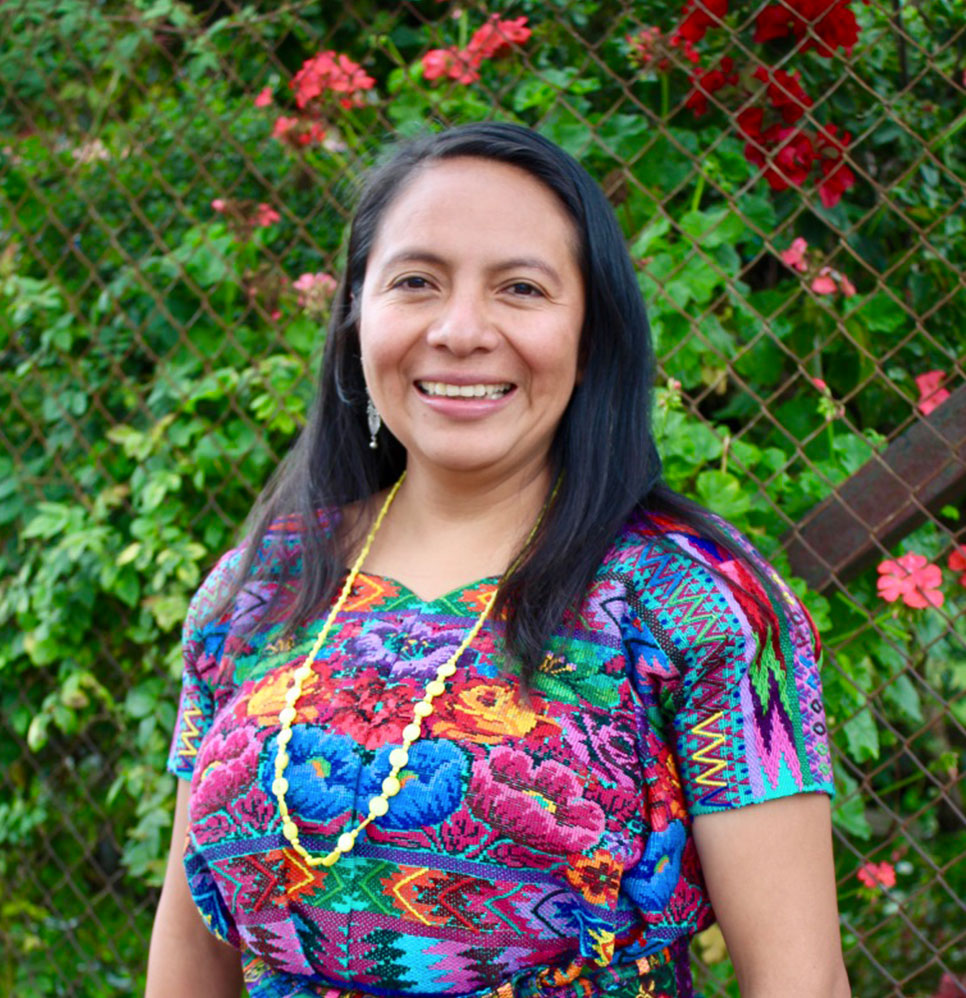
Elvia Raquec of WJI
We interviewed Elvia Raquec, Programs Director at Women’s Justice Initiative, who oversees the expansion of the organization’s work to new communities.
Tell us about the Women’s Justice Initiative and the work you’re doing with support from Tinker.
ER: Women’s Justice Initiative (WJI) is an organization that improves the lives of indigenous girls, adolescents, and women in isolated rural communities where they have limited access to public services. WJI offers legal assistance and legal education, and in this way helps prevent violence against women and girls and shifts norms and attitudes that treat violence as acceptable. We implement a rights-based legal empowerment methodology that enables indigenous women to know and use the law to protect their wellbeing. With the help of Tinker, we’re advancing in our mission. Currently, we are working in 12 new communities in the municipality of San Juan Comalapa, Chimaltenango, where we have established relationships with community leaders and local organizations to share our work. Now in March, we’re beginning to offer our training on Legal Education and Assistance to groups of women in six communities; 150 have already signed up. We hope these women will be able to complete their learning process and apply what they have learned about their rights.
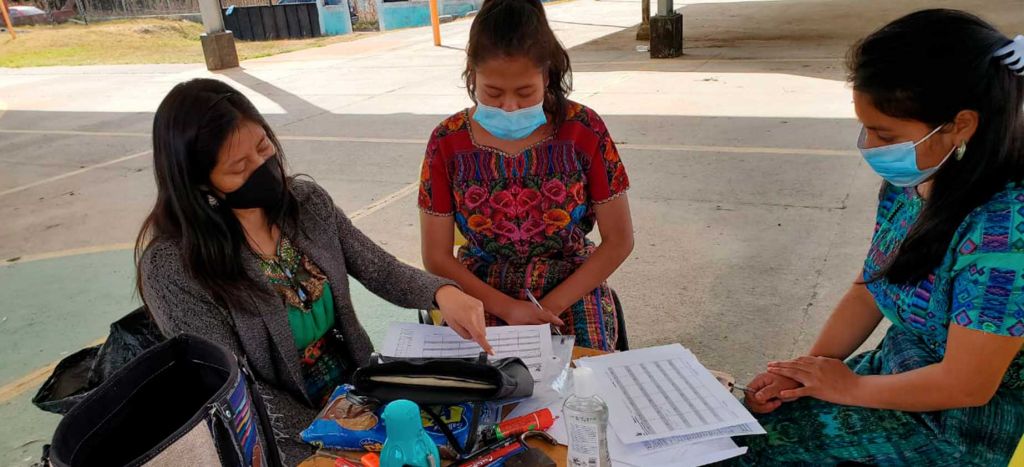
Community Advocates from WJI prepare a training in the municipality of San Juan Comalapa.
How has the pandemic affected the communities where WJI works? What ongoing needs do you see?
ER: The pandemic has really affected the various families in the communities where we work. Many lost their jobs and others had to close their businesses due to local restrictions. The price of basic goods has gone up; this has put a lot of financial pressure on families, which in turn increases gender inequality and violence against women and girls. The number of formal complaints of violence went down significantly in 2020, probably due to the challenges of reporting these cases during the pandemic. Once COVID-19 restrictions started to loosen at the beginning of 2021, the number of complaints increased to levels higher than before the pandemic. The current needs in the communities are employment, effective mechanisms for reporting gender-based violence, and safe spaces for participation and learning so that women can leave their homes where they have been confined during the pandemic. Many women have been forced to endure violence at home because they don’t have anyone to share their problems with or ways to seek help, making the situation even worse.
When you consider how your organization has responded during the pandemic and the hurricanes, what stands out?
ER: In the last year, WJI expanded its activities in response to needs on the ground. We developed a three-part COVID-19 response strategy: legal and psychological services delivered remotely, emergency food baskets, and radio programming. We offered legal and psychological assistance to 475 women in 100 different communities through a new direct telephone line. We provided 5,200 masks and 2,565 food baskets, which can feed a family of five for a month, to women in our programs so that they knew WJI was accompanying them. With a coalition of local organizations, we created informative radio spots that reached approximately 100,000 people in more than 100 municipalities. All this time, our community advocates continued referring and responding to cases of violence against women and girls. In turn, they received a monthly stipend and medical kits for home use. The pandemic has shown us that we can adapt WJI’s programs quickly to respond to crisis situations in the communities where we work. Our response was effective because it was based on strong local relationships, which we have been building for years, especially with the community advocates. We’ve also successfully integrated new technologies into our methodology, which will now be an important feature of future programming.
This interview was translated into English by the Tinker team.
SPANISH
Entrevista con La Iniciativa de los Derechos de la Mujer
Para marcar el aniversario de la pandemia en nuestro hemisferio, entrevistamos a tres organizaciones apoyadas por Tinker sobre sus experiencias en el último año. Lea las demás entrevistas aquí.

Elvia Raquec de WJI
Entrevistamos Elvia Raquec, Directora de Programas en La Iniciativa de los Derechos de la Mujer. Ella dirige la expansión de la organización a nuevas comunidades.
Cuéntanos un poco sobre La Iniciativa de los Derechos de la Mujer (IDM, o Women’s Justice Initiative en inglés) y el trabajo específico que están llevando a cabo con el apoyo de Tinker.
ER: La Iniciativa de los Derechos de la Mujer (IDM) es una organización que mejora la vida de las niñas, jóvenes y mujeres indígenas de las comunidades rurales más aisladas y donde tienen poco acceso a servicios públicos. IDM ofrece servicios de asesoría legal, alfabetización legal y de esta forma previene la violencia contra las niñas y mujeres (VCMN) y transforma las normas y actitudes que consideran la VCMN como normal y aceptable. IDM implementa una metodología de empoderamiento legal basada en derechos que permite a las mujeres indígenas conocer y usar la ley para su bienestar. Con el apoyo de Tinker, vamos avanzando en nuestra misión. Actualmente estamos trabajando en 12 comunidades del municipio de San Juan Comalapa, Chimaltenango, donde hemos tenido acercamiento con líderes comunitarios y organizaciones locales, para dar a conocer nuestro trabajo e intervenciones comunitarias. Este mes de marzo empezamos a ofrecer nuestro curso de Alfabetización Legal y Asesoría Legal a grupos de mujeres en seis comunidades donde se han inscrito ya 150 mujeres. Esperamos que las mujeres puedan terminar su proceso de aprendizaje y aplicar en sus vidas lo que aprendan sobre sus derechos y así poder ejercerlos.

Asesoras Comunitarias de IDM preparan una capacitación en el municipio de San Juan Comalapa.
¿Cómo ha afectado la pandemia a las comunidades donde trabaja IDM? ¿Qué necesidades persisten todavía?
ER: La pandemia realmente ha afectado a varias familias de las comunidades donde tenemos intervención comunitaria porque muchos perdieron su trabajo y otros cerraron sus negocios debido a que ya no hay mucho movimiento dentro de la misma comunidad. Los precios de la canasta básica han aumentado y esto ha afectado la economía familiar y así mismo aumenta la desigualdad de género y la VCMN en los grupos más vulnerables, especialmente las mujeres. El número de denuncias formales de casos de VCMN disminuyó significativamente en el 2020, probablemente debido a los nuevos desafíos en el reporte de casos en las comunidades rurales. A medida que las restricciones de COVID-19 se aflojaron a principios de 2021, las denuncias de VCMN han comenzado a aumentar a niveles más altos que los observados antes de la pandemia. Las necesidades actuales de la población de las comunidades rurales son tener un empleo para poder cubrir sus necesidades básicas, tener oportunidades de acceso para denunciar la VCMN, y tener espacios de participación y de aprendizaje para las mujeres para que puedan salir de sus hogares, ya que la pandemia las ha encerrado. Esto ha sido difícil para ellas porque muchas sufren de violencia y se ven forzadas a soportarla, debido a que no tienen alguien a quien contar sus problemas o buscar apoyo, agravando así la situación.
Cuando consideras cómo ha respondido IDM en el último año, ¿qué se destaca?
ER: En el último año, IDM acopló sus actividades de acuerdo a las necesidades que fueron surgiendo debido a la pandemia. IDM desarrolló una estrategia de respuesta al COVID-19 que consistió en tres partes: servicios legales y psicológicos a distancia, entregas de alimentos de emergencia y programación radial. A través de una línea directa nueva, brindamos asesoramiento legal y psicológico a 475 mujeres en 100 comunidades diferentes. Proporcionamos 5,200 mascarillas y 2,565 bolsas de víveres -las cuales pueden alimentar a una familia de cinco personas por un mes- a las mujeres participantes de nuestros programas para que ellas sintieran en ese momento que IDM estaba con ellas. Con una coalición de organizaciones locales, creamos programas informativos de radio que llegaron a aproximadamente 100,000 personas en más de 100 municipios. Además, las Asesoras Comunitarias seguían refiriendo y acompañando casos de VCMN, así que recibieron un pequeño estipendio mensual durante 8 meses y un kit de medicamentos para cubrir sus necesidades dentro del hogar.
